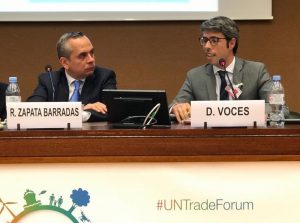European fishing industry body Europêche is giving its full support to an ambitious multilateral agreement with the aim of abolishing damaging fishery subsidies – stating that public aid needs to continue with the clear objective of achieving environmental, economic and social stability.
As part of the United Nations Sustainable Development Goals (SDGs) agenda, the World Trade Organisation (WTO) has been given a prominent role to regulate and discipline global fisheries subsidies. The chief aim is to eliminate IUU subsidies and prohibit certain forms of fisheries subsidies that contribute to overcapacity and overfishing by 2020.
To speed up the complex intergovernmental negotiations, a high-level event focusing on trade, climate change and ocean economy took place in Geneva this week, where Europêche presented the huge progress made in Europe towards eliminating harmful subsidies and securing the sustainable and responsible management of fisheries resources.

There was consensus during the conference that no government shall grant or maintain any subsidy to vessels and operators engaged in IUU fishing. Europêche called for the elimination of subsidies that negatively affect targeted fish stocks that are in an overfished condition.
In addition, Europêche defended financial aid to modernise fishing vessels and to improve energy efficiency, while emphasising that these investments must be subject to stringent conditions so as to avoid any increase in the overall capacity and to fully respect international goals.
‘While EU funding policies are strongly oriented towards sustainable fisheries, reduction of CO2 emissions, adjustment of fishing capacity, control and data collection programmes, Asian countries are using the money to exponentially increase their fleets and subsidise their running costs,’ said Europêche’s managing director Daniel Voces, reminding delegates that the removal of capacity-enhancing subsidies will not reach WTO goals unless accompanied by sustainable fisheries management, transparency, accountability and enforcement.
‘The EU is the largest and most attractive fish market in the world. European fleets have to comply with the highest social and environmental standards while competing with non-EU fleets whose catches end up in our market. For that reason it is important to achieve an international level playing field, so as for all operators to play under the same rules,’ he said.
‘Financial support is fundamental to improving safety at sea, working conditions, energy efficiency, and the competitiveness of our responsible fishermen who daily supply healthy seafood to a growing world-population. These investments are key in Europe to make the industry more attractive to young professionals, introduce new technologies, mitigate climate change, combat shortage of crews and allow for generational change to take place.’









